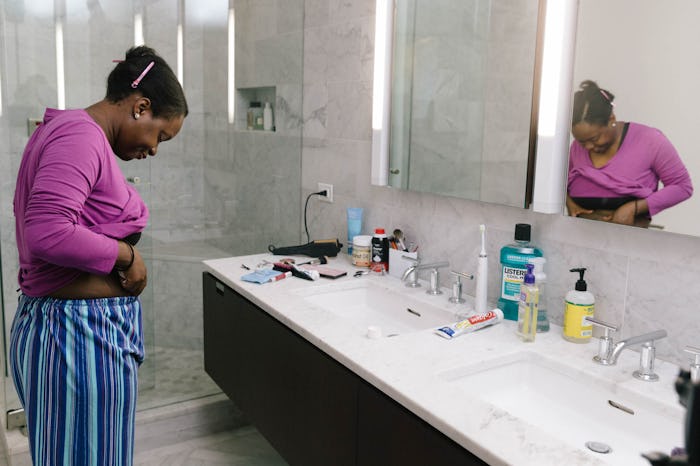In my opinion, there's no such thing as a "strange question" when you're pregnant. Pregnancy in and of itself is strange, so of course any inquiries pertaining to growing a human being inside your body are going to err on the side of odd. So if you've been asking yourself, "Why does your navel stretch during pregnancy?" please know that you're not a weirdo. I mean, this is your body we're talking about. It's OK to ask what in the hell is going on with it, and be as informed as possible as it continues to change throughout the course of your pregnancy.
According to The American College of Obstetricians and Gynecologists (ACOG), there's a variety of skin conditions you might experience during pregnancy, including the inevitable stretching of the stomach — navel and all. Just as you're likely to get stretch marks from your skin growing to accommodate your ever-expanding belly, your navel is likely to change shape, tingle, itch, or stick out when you're pregnant. These navel changes happen as the result of, quite simply, the stretching of your stomach. There may be slight pain or discomfort as the muscles and ligaments grow to support your enlarged uterus, too. And speaking of the navel area, along with the stereotypical stretch marks, you might also notice the linea nigra, which The American Pregnancy Association (APA) describes as a dark line that runs from the navel down the belly. It's usually temporary, disappearing sometime after delivery, but it can be a little, well, surprising.
During the later stages of pregnancy, Parents magazine says as your belly begins to stretch and protrude, there's even a chance that your navel can become herniated (it's called an "umbilical hernia"). Yes, it's as painful as it sounds, especially if left untreated. Thankfully, it's relatively uncommon and, per Parents, "Your doctor should notice this during one of your routine prenatal visits and should be able to gently nudge it back. In very rare instances, an umbilical hernia may require minor surgery to repair."
If you have a navel piercing and worried about how your stretching navel will affect it, the website SheKnows says that, in accordance with the APA, as long as it's comfortable, it's not causing any pain, and it's not irritated or infected you can keep your navel piercing in. The same site does say, however, that at 20 weeks your uterus moves up towards the navel and, as a result, the pressure might prove to be uncomfortable. Your best bet is to simply take your piercing out, for comfort's sake if nothing else, and either insert the piercing postpartum or have it re-pierced if/when it closes up.
If the stretching around your navel becomes painful in an abrupt, sharp kind of way, contact your doctor immediately to rule out something more serious. Itching during this pregnancy phase is typical, unless it becomes irritated and you notice a rash that won't go away with safe treatment options, like lotions and approved oils. If you notice small, red bumps that itch, talk to your doctor to rule out a condition that affects one out of every 200 pregnant women: Pruritic Urticarial Papules and Plaques of Pregnancy (PUPPP). This condition usually appears in the third trimester and, according to American Osteopathic College of Dermatology (AOCD) will "typically disappear within 15 days after delivery." The site goes on to say that "even without therapy, women often seek treatment for symptomatic relief due to the intense itching."
How much a navel stretches during pregnancy, or to what extent, varies from woman to woman. If the discomfort is painful or bothersome enough that you can't ignore it, call your doctor or midwife for suggestions on how to alleviate some of those sensations. Things such as doctor-approved medicines, oatmeal baths, and keeping the area well moisturized will, usually, be able to combat the cumbersome itchiness. You might be find that your navel is temporarily stretched out but, over time, your body will find its way back to neutral.
Check out Romper's new video series, Bearing The Motherload, where disagreeing parents from different sides of an issue sit down with a mediator and talk about how to support (and not judge) each other’s parenting perspectives. New episodes air Mondays on Facebook.
